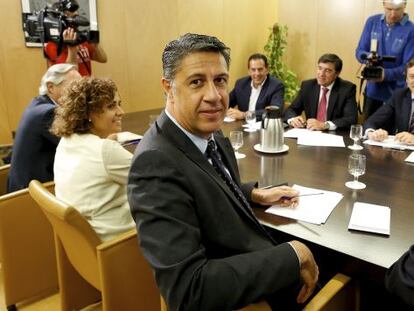Pro-independence parties will win slim majority at election — CIS poll
Latest survey predicts victory for parties that want to break away from Spain Regional premier Artur Mas considers vote a plebiscite on plans to secede

The parties running on a joint pro-independence ticket in the Catalan regional election on September 27 are likely to win a narrow majority, thus paving the way for a possible unilateral declaration of independence from Spain. That’s according to the latest poll carried out by Spain’s Center for Sociological Research (CIS), an independent body that reports to the Prime Minister’s Office.
The Junts pel Sí (literally, together for yes) coalition and the Popular Unity Candidacy (CUP) parties would take a combined 68 or 69 seats in the regional parliament, according to the poll. The number of seats needed for an absolute majority is 68.
Junts pel Sí and CUP would take 68 or 69 seats in the regional parliament. An absolute majority is 68
Catalan regional premier Artur Mas has stated that if pro-independence groups achieve an absolute majority at the upcoming polls, his government will continue with its efforts to achieve independence from Spain for the northeastern region. The CIS survey predicts that Junts pel Sí and CUP would garner 44% of the votes cast.
Junts pel Sí is a bloc made up of Mas’s Democratic Convergence of Catalonia (CDC) party, the Catalan Republican Left (ERC) and pro-sovereignty civil associations. Together they would win between 60 and 61 seats in the parliament, according to the CIS poll. CUP – a radical left-wing pro-independence party – would garner eight seats and 5.9% of the vote. The rest of the parties that are running would not be able to achieve an absolute majority.
The survey also asked respondents what kind of state they would prefer Spain to be. A total of 46.1% answered that they wanted “a state in which autonomous regions are given the possibility of converting into independent states.”
The second most popular response – with 27.8% support – was for “a state in which autonomous regions have greater autonomy than they do now.”
Catalonia has been ramping up the pressure on the central government to be allowed to decide on its future for months now. An informal referendum on self-rule was held late last year, but ran afoul of Spanish prosecutors, who filed charges against Mas and several aides for organizing it.
The center-right Popular Party government, which is headed by Prime Minister Mariano Rajoy, is fiercely against independence for Catalonia, and recently announced plans to give the Constitutional Court powers to fine or suspend elected officials and civil servants who fail to comply with its rulings.
Though applicable to all public administrations, the initiative has been devised to deal with a possible unilateral declaration of independence from Spain in Catalonia.
English version by Simon Hunter.
Tu suscripción se está usando en otro dispositivo
¿Quieres añadir otro usuario a tu suscripción?
Si continúas leyendo en este dispositivo, no se podrá leer en el otro.
FlechaTu suscripción se está usando en otro dispositivo y solo puedes acceder a EL PAÍS desde un dispositivo a la vez.
Si quieres compartir tu cuenta, cambia tu suscripción a la modalidad Premium, así podrás añadir otro usuario. Cada uno accederá con su propia cuenta de email, lo que os permitirá personalizar vuestra experiencia en EL PAÍS.
En el caso de no saber quién está usando tu cuenta, te recomendamos cambiar tu contraseña aquí.
Si decides continuar compartiendo tu cuenta, este mensaje se mostrará en tu dispositivo y en el de la otra persona que está usando tu cuenta de forma indefinida, afectando a tu experiencia de lectura. Puedes consultar aquí los términos y condiciones de la suscripción digital.









































